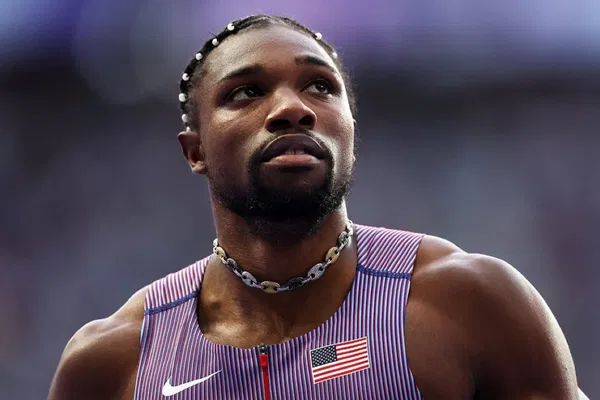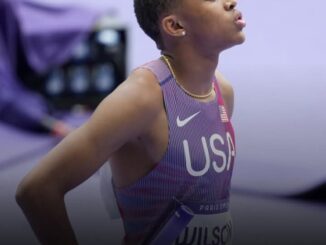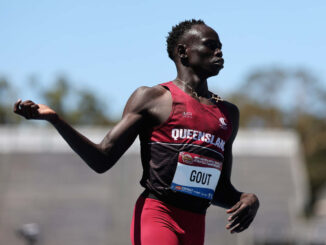
Quincy Wilson is quickly becoming a familiar name in track and field, making headlines much like Noah Lyles. This time, the 17-year-old took center stage at the New Balance National Indoor Championships. Competing in the 400m on March 15, Wilson claimed victory with a blazing 45.71 seconds a mark that now stands as the second-fastest time in high school history and the fastest ever at the New Balance Nationals Indoors. In fact, he broke his own previous record of 45.76 from 2024. But this win wasn’t just about speed—it was about resilience.
Wilson’s triumph becomes even more impressive when considering the circumstances. He wasn’t just racing against the clock—he was battling his own body. The young star revealed that he ran this historic time while dealing with breathing difficulties and other health issues. This revelation draws a striking parallel to Noah Lyles, the world’s fastest man, who has battled chronic asthma throughout his career. Now, Wilson, a rising star with Olympic potential, shares a similar struggle.
Racing in Boston on March 15, Wilson edged past Andrew Salvodon, who clocked 45.84, the fourth-fastest time in high school history. After the race, Citius MAG shared a clip of Wilson breaking down his performance. He described his smooth start and focused approach, saying, “I gotta go get six (sixth lane). When I came out of the blocks, I felt smooth.” His strategy was to conserve energy early, adjusting his arm movement accordingly.
However, Wilson faced his first challenge when his Bullis High School teammate, Cameron Homer, surged ahead on the inside. Staying composed, Wilson reassured himself: “Don’t panic. Been in this situation before.” His goal was to take the lead at the break, a move he had been unable to execute all season. “I kind of, like, got the break,” he said. Determined not to run in lane two, he made his move: “I had to run outside, but I was just, like, I’m not running lane 2 this year. I’m cutting him. I cut him.”
With the crowd roaring, Wilson took control of the race, but his body started to rebel. “I’m starting to feel it; all my lungs feel terrible… because of the flu,” he admitted. And the flu wasn’t his only hurdle.
Despite the struggle, Wilson pushed through to claim victory. “I gotta be a dog,” he said, recalling how Salvodon closed in on him near the finish. “I gotta go to my arms. I gotta run.” Though Salvodon made a late surge, Wilson held him off to secure the win. After crossing the line, he soaked in the moment, hyping up the crowd as if to remind them who the number one was.
In reflecting on his preparation, Wilson revealed just how much adversity he overcame. “I even had bad asthma, so it took me a long time to get back,” he said. His absence from competition since the USA Indoor Championships on February 23 now made sense he had been battling illness. “I haven’t run since USA’s. I’ve been in bed. I was real sick.” He relied on his inhaler and other treatments to ensure he was ready to compete.
This isn’t the first time Wilson has powered through physical challenges. His most significant career milestone qualifying for the Olympics came because he refused to let injuries hold him back. During the qualifying heats, he clocked a 47.27 split time in the 4x400m relay, helping Team USA advance to the final with a time of 2:59.15. The rest, as they say, is history.
Wilson’s asthma revelation draws comparisons to Noah Lyles, who has managed the condition since childhood. Asthma, a condition that causes airway inflammation and difficulty breathing, has been a lifelong battle for Lyles. In a 2020 interview with CNN, the sprinter explained, “Asthma affects everything I do health, physical fitness, even emotions. If you’re emotionally fatigued, it can weaken your immune system.”
Lyles’ parents took every possible step to manage his condition, from homeschooling him to modifying his diet and seeking medical treatments. Yet, asthma still impacted his life after races, he would often return home so exhausted that he had to miss school the next day.
But Lyles never let his condition define him. At the Paris Olympics, he proved it by winning the 100m gold in 9.784 seconds. Afterward, he posted on social media: “I have asthma, allergies, dyslexia, ADD, anxiety, and depression. But I will tell you that what you have does not define what you can become. Why not you?”
Even when illness struck, Lyles pushed through. He placed third in the 200m final despite running with COVID. After the race, he collapsed and had to leave the track in a wheelchair, but he still left Paris with two medals.
Like Lyles, Wilson refuses to let asthma or illness dictate his path. His New Balance Nationals victory is just another testament to his determination. If history is any indication, this is only the beginning.





Be the first to comment